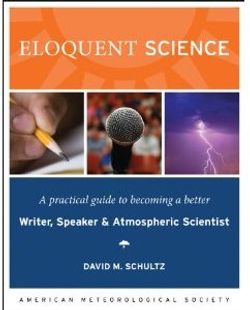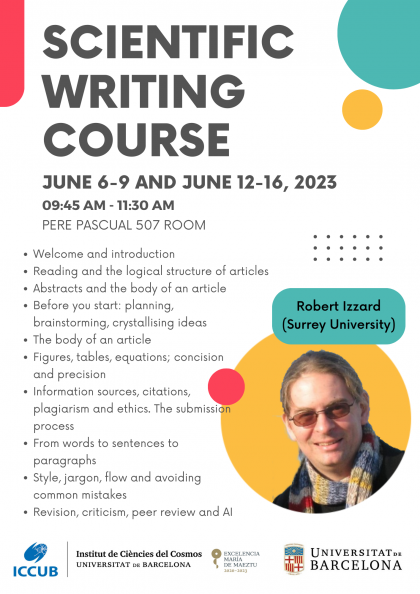Scientific writing
Scientific Writing
The Institute of Cosmos Sciences of the University of Barcelona (ICCUB) together with the Institute of Professional Developement (IDP-ICE) of the University of Barcelona have organized the Course "Scientific Writing" given by Robert Izzard (University of Surrey). The course consists in a short set of classes introducing students of science to the aims and technique of scientific writing.
Dates: June 6-9 and June 12-16 from 9:45AM to 11:30AM
Classes are typically 30-40 minutes of teaching and discussion, with a short break, followed by group exercises. This structure will be mixed up when appropriate.
6 June: Reading and the logical structure of articles
7 June: Abstracts and the body of an article
8 June: Before you start: planning, brainstorming, crystallising ideas
9 June: The body of an article
12 June: Figures, tables, equations; concision and precision.
13 June: Information sources, citations, plagiarism and ethics. The submission process
14 June: From words to sentences to paragraphs
Exercises Varying the openings to sentences and being fluid in writing.
15 June: Style, jargon, flow and avoiding common mistakes
16 June: Revision, criticism, peer review and AI
Exercise: assess a colleague's writing, providing detailed feedback.
Reading material
 |
Eloquent Science: A Practical Guide to Becoming a Better Writer, Speaker, and Scientist (Schultz 2010; ISBN 978-1878220912). This book is written for meteorologists, but most of the principles are equally applicable to scientists of any background. When putting this course together, I read about a dozen books on scientific writing, and started reading a few more. Eloquent Science is the only one I recommend. |
There are, naturally, other books. If you are an astroperson, Scientific Writing for Young Astronomers (EDP Sciences, ed. C. Sterken; Book 2 especially is relevant, ISBN 978-2-7598-0506-8) may appeal. In two volumes, this offering from Astronomy and Astrophysics is based on their lecture course so this is more a proceedings than a guide. The sections on the publishing process and language editing are worth a look.
Reference books are important and many are cheaply or freely available online. For example, The Elements of Style (Strunk and White, 2008 edition, ISBN 978-0205632640) can be downloaded at Project Gutenburg.
The classic reference for spelling, use and etymology is the Oxford English Dictionary. You may also wish to read Fowler's Guide to Modern English Usage which is, in many places, both informative and funny.
If you are interested in etymology, the origin of words, check of etymonline.com, one of the most amazing places on the interweb.
To get into the modern world, check out ChatGPT.
